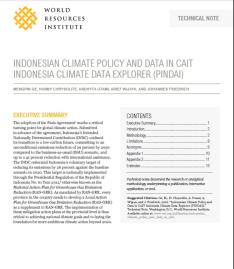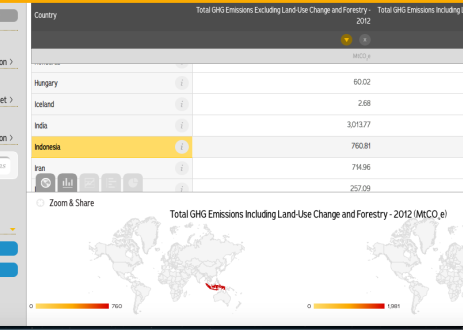Indonesian Climate Policy and Data in CAIT Indonesia Climate Data Explorer (PINDAI)

Synopsis
The adoption of the Paris Agreement marks a critical turning point for global climate action. Submitted in advance of the agreement, Indonesia’s Intended Nationally Determined Contribution (INDC) outlined its transition to a low-carbon future, committing to an unconditional emissions reduction of 29 percent by 2030 compared to the business-as-usual (BAU) scenario, and up to a 41 percent reduction with international assistance. The INDC reiterated Indonesia’s voluntary target of reducing its emissions by 26 percent against the baseline scenario in 2020. This target is nationally implemented through the Presidential Regulation of the Republic of Indonesia No. 61 Year 2011, otherwise known as the National Action Plan for Greenhouse Gas Emissions Reduction (RAN-GRK). As mandated by RAN-GRK, every province in the country needs to develop a Local Action Plan for Greenhouse Gas Emission Reduction (RAD-GRK) as a supplement to RAN-GRK. The implementation of these mitigation action plans at the provincial level is thus critical to achieving national climate goals and to laying the foundation for more ambitious climate action beyond 2020.
The World Resources Institute (WRI) developed the Indonesia Climate Data Explorer, or Platform Interaktif untuk Data Iklim (PINDAI). This is an open, bilingual (Bahasa Indonesia and English) online platform featuring Indonesian national- and provincial-level climate policy information and data, including historical and projected emissions, climate actions, and development plans. WRI created this platform to help provincial government officials (and others) measure and report high-quality emissions and to create a framework for data-driven decision making within Indonesia. The tool aims to increase public awareness and understanding of climate actions in Indonesia, and to facilitate and improve alignment between national and subnational implementation. This technical note accompanies the Indonesia Climate Data Explorer, explaining the data sources and methodological approach used for compiling the relevant data, as well as the limitations of data availability and quality.
Tab Ubah Suai
Projects

Indonesia Climate Data Explorer - Platform Interaktif untuk Data Iklim (PINDAI)
Visit ProjectAn online platform for climate data and information visualizations that support many dimensions of climate policy making.
Part of Climate
